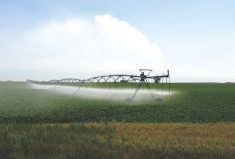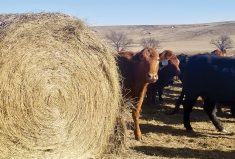
 Sitting as it does on a kind of plateau north of the highlands of Riding Mountain National Park, it’s hard to believe that this area could be flooded at all.
Sitting as it does on a kind of plateau north of the highlands of Riding Mountain National Park, it’s hard to believe that this area could be flooded at all.
Read Also

Mazergroup’s Bob Mazer dies
Mazergroup’s Bob Mazer, who helped grow his family’s company into a string of farm equipment dealerships and the main dealer for New Holland machinery in Saskatchewan and Manitoba, died July 6 from cancer.
But a flash flood did sweep through the century-old farmyard of cattle producers Karen and Craig Von Bargen on April 28 — causing six-figure losses and creating divisions in the community.
The Von Bargens say lax enforcement of drainage regulations is to blame, with grain farmers uphill from them using heavy equipment to gradually erase the wide, shallow water courses that formerly carried spring meltwaters away at a gentle pace across their fields. Instead, water now races through ditches and quickly becomes the problem of somebody downstream.
“We are the only ones who have left a visible, natural run, so all these farmers think that all the water should come through our yard,” said Karen Von Bargen, who runs 200 head of cattle on 12 quarters in the area with her husband.
The couple estimates the flood was one-eighth of a mile wide and about three to five feet deep. They live two miles away from the Wilson River and are about 45 feet above it.
Water Stewardship officials aren’t commenting — except to say they are investigating — but that hasn’t stopped accusations from being made.
The Von Bargens have photos that show a clear boundary where the flood waters were stopped by a dirt dam from proceeding east overland into a field and instead were channelled north to the Von Bargen’s yard. Red flagging tape and wooden stakes could be seen marking the spot last week. Karen Von Bargen said the municipality has ordered the structure removed. The landowner, Dale Gryba, declined to comment.
“I’m personally involved, so I can’t comment — call the RM, call Water Stewardship,” said Gryba.
The Von Bargens said their relationship with their neighbour has soured, but added the larger issue is a lack of enforcement of drainage rules.
That view is shared by another neighbour, Kate Storey.
What happened to the Von Bargens is a microcosm of a problem developing across the province, said Storey, chair of the Manitoba Organic Alliance and a Green Party candidate in the last federal election.
“The water comes off that escarpment from the park and there used to be a whole series of sloughs and bits of bush all through the area that held the water back,” said Storey.
“The problem is that all those sloughs have been drained and all the water is coming down in one big, fast flood.”
In past decades, most farms in the area pastured cattle in the patches where overland flows tended to accumulate, and seeded crops on less flood-prone areas, she said.
But high grain prices and the availability of heavy equipment for flattening out the landscape changed all that, said Storey, who charged that Water Stewardship has “dropped the ball.”
“Farmers want to farm and they are going to drain their land, but the permit system is supposed to tell them what they can and can’t do,” she said.
“If Water Stewardship is allowing the drainage water to create a problem downstream, then obviously they aren’t doing their jobs.”
Some of those problems are falling on the local municipality. A backhoe operator who was patching a washed-out culvert last week said as many as 130 culverts have had to be repaired in the RM this spring.
A spokesperson for Water Stewardship would not give a timeline for when the results of its investigation would be made public.



















